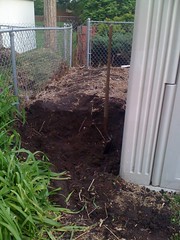| Compost (Photo credit: Joe Hoover) |
Most often, gardeners use compost to enrich their garden soil. When compost is added the soil, the overall structure of the soil is improved allowing it to hold more water and letting air circulate better within the soil, as well as helping plants absorb nutrients more easily.
Contrary to some of your perceptions, compost is quite easy to make and is especially easy to use. There are several methods that may be used when creating compost.
I would suggest using some kind of compost bin to keep everything confined to one place. You will avoid making a mess in your backyard if you do so. Plus, temperature and moisture can also be regulated if you construct a compost bin but allow the organic materials to be composted to touch the soil. You need to allow your earthworm buddies and other organic microbes to help out in the decomposing process.
Although almost all organic materials could go into your compost pile, a good combination of “greens” and “browns” is best. The “greens” refer to nitrogen-rich organic matter like fresh grass, leaves, and vegetable scraps from your kitchen. The “browns”, on the other hand refer to organic matter that contains a lot of carbon such as dried leaves, straw and, of course, wood chips or shavings.
| A homeowner sifts soil from his compost bin. Composting is an excellent way to recycle household and yard wastes. (Photo credit: Wikipedia) |
Some would suggest that the best proportion is when 25 percent of your compost pile is made of “browns” and 1 percent is made of “greens.” Take note that if you have a large part made up of “browns” the compost pile will decompose more slowly. On the other hand, having too much “greens” on the pile can cause some serious smell.
Other elements that you should always consider when making compost are the air and the amount of water your pile will need. It is best to keep your compost pile damp. This will help in the decomposing process. Air is also needed so make sure your pile is properly aerated. Air can be incorporated if needed by turning over your pile. Observe and periodically aerate your pile until you can “harvest” the fruits of your labor - great compost to feed your growing plants.
It may take a little bit of effort to create great compost, but the results of composting are really worthwhile - for both you and your garden.



No comments:
Post a Comment